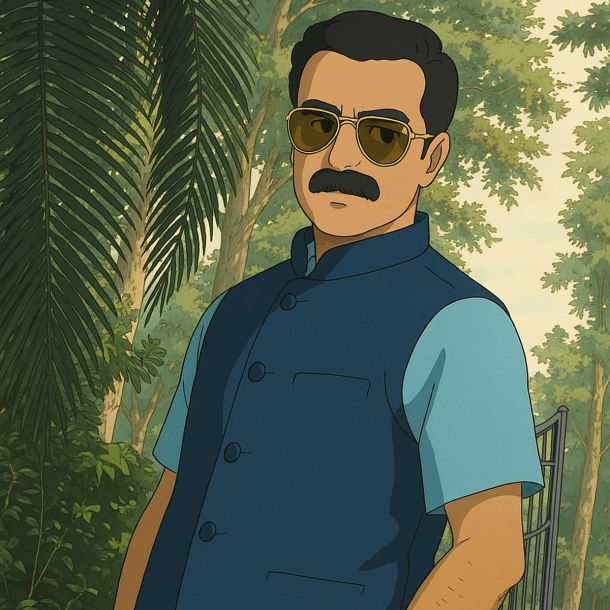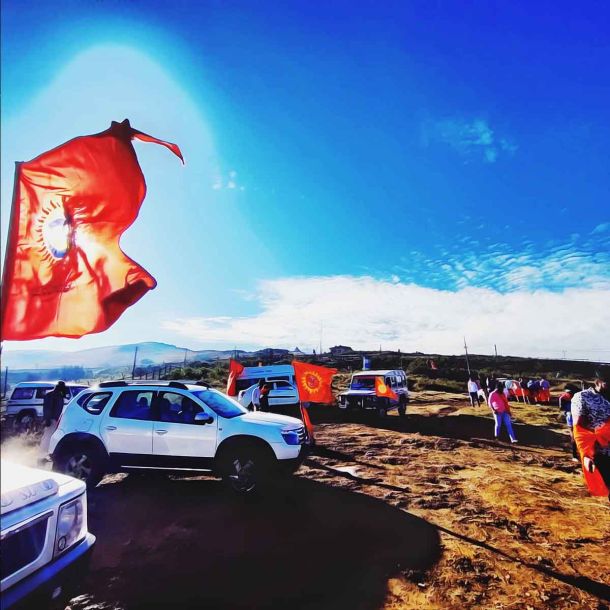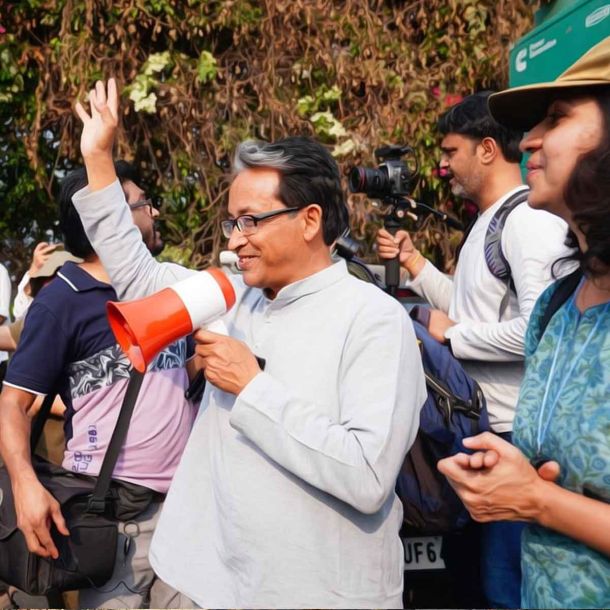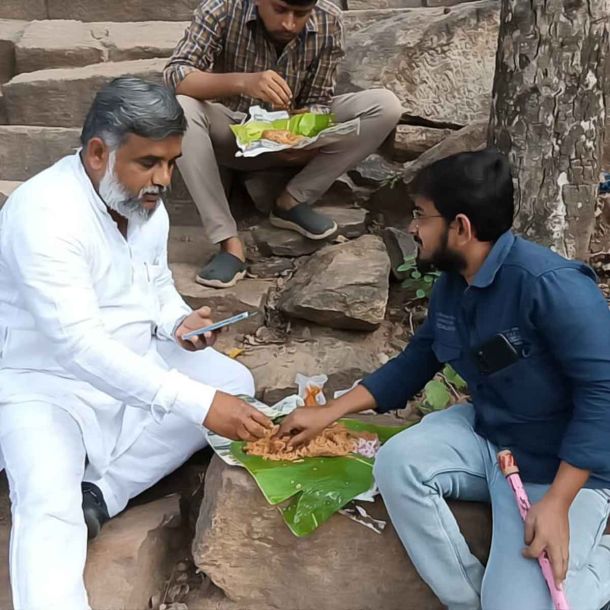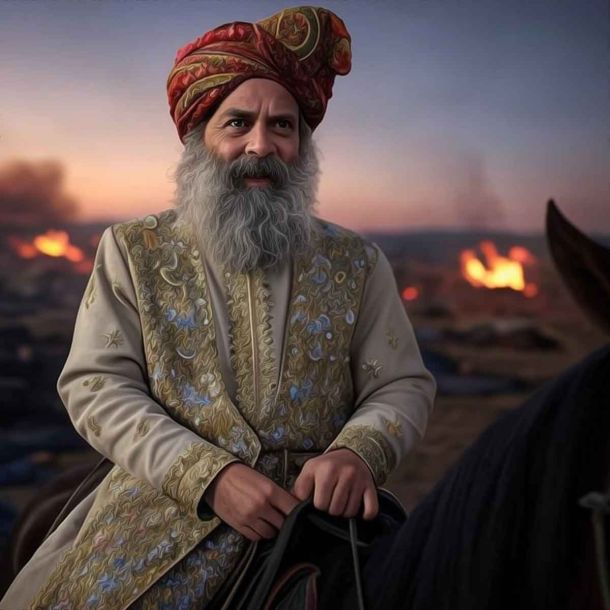More Coverage
Twitter Coverage
Satyaagrah
Written on
Satyaagrah
Written on
Satyaagrah
Written on
Satyaagrah
Written on
Satyaagrah
Written on
Join Satyaagrah Social Media
"Lady Bhagirathi": Gowri Naik, at 55, grabs her pickaxe and digs a life-giving well, reaching 67 feet into Karnataka's parched soil to quench the thirst of future generations, fueled by deep love and a fierce determination to sustain her community
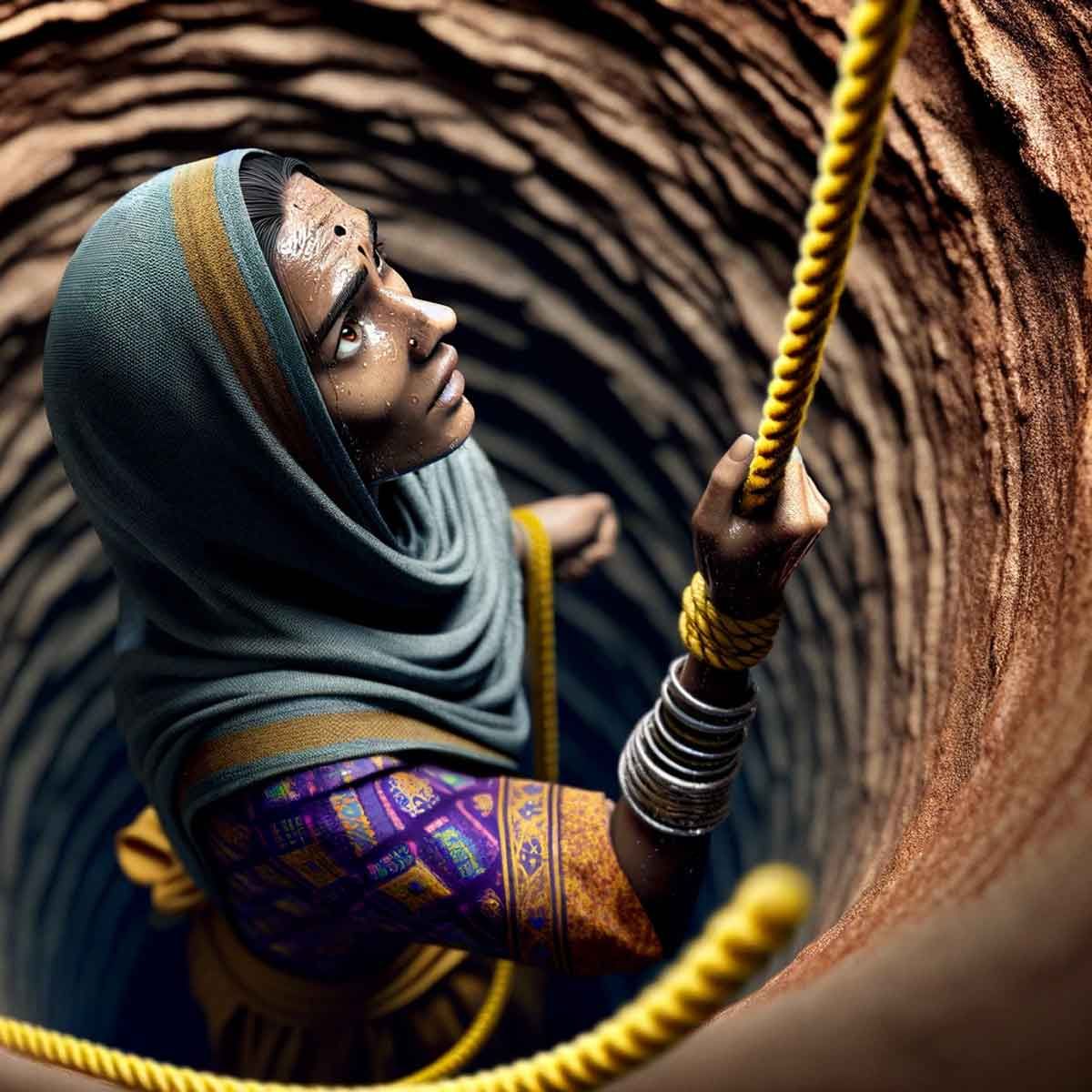
In every corner of the world, women have proven that they stand shoulder to shoulder with men, mastering every field and undertaking roles once considered beyond their reach. Today, we spotlight a remarkable woman from Karnataka, whose determination and strength paralleled the legendary figures of Indian lore. She was likened to Bhagirath, who was said to have brought the Ganges to the earth, and Dashrath Manjhi, the man who single-handedly cut a path through a mountain in Bihar. Known affectionately as "Lady Bhagirath," this woman took it upon herself to address a critical issue in her community—the dire water shortage.
|
A recent article in the Hindustan Times highlighted the endeavors of Gauri Chandrashekhar Naik, a 55-year-old resident of Ganesh Nagar in Uttara Kannada district. Observing the difficulties faced by children at the local Anganwadi due to the lack of water, Gauri took a bold step. Just a week prior, she had initiated the digging of a well right next to the Anganwadi center close to her home. The well, four feet in width, was a testament to her resolve. Every day, she dug down a further one and a half feet. Armed with simple tools—a pickaxe, a shovel, a basket, and a rope—she tirelessly extracted soil, basket by basket, aiming to complete the well within a month to ensure the Anganwadi had a reliable source of water.
Gauri’s daily routine was rigorous, as described by her son, Vinay Naik. She started her work at 7:30 AM, paused at noon, then resumed at 3 PM and continued until 6 PM. This strict schedule underscored her commitment to completing this self-assigned mission as swiftly as possible.
The motivation behind Gauri’s hard work was deeply personal and poignant. She shared that the acute water scarcity in Ganesh Nagar severely impacted the children at the Anganwadi, who struggled to access safe drinking water. "The children had to fight hard to get water," Gauri had expressed, her voice heavy with concern. This ongoing struggle of the youngest members of her community was what drove her to start digging the well.
Gauri Chandrashekhar Naik's commitment to resolving water shortages in her community is not a new chapter in her life. Her journey began years ago, with notable efforts in 2017 and 2018, when she successfully dug two wells. Her motivation has always been clear and simple: to ensure that no one in her community has to endure the hardship of lacking access to clean drinking water. "I had dug a 65-feet deep well near my house to irrigate my betel nut crop," she recalled, her eyes reflecting a mix of resolve and reminiscence.
The backstory of Gauri's first foray into well-digging reveals her acute awareness of her community's needs. Facing a severe water shortage that threatened her small farm, she took matters into her own hands. Within three months, she dug a well, which proved to be a success, providing much-needed water. Not stopping there, she continued her efforts the following year, creating another well, this one 40 feet deep, further helping alleviate the water scarcity in her field.
Gauri's current project, the well at the Anganwadi center, holds a special place in her heart. The center, a haven for 15 children, providing care and education, has been struggling with a consistent water supply. "The continuous water shortage has become a major challenge," Gauri explained. The local Hutgar Gram Panchayat's water supply, limited to once every two days, compelled the children to trek far from the Anganwadi center just to fetch drinking water. Gauri's resolve was clear as she stated, "Once the well is ready, there will be no more water issues."
The practicalities of Gauri's current endeavor are grounded in her daily routine, which her son, Vinay Naik, detailed with a sense of pride. Their family owns a piece of land and an aquarium shop in Sirsi, which provides some support for their livelihood, but it's the well project that captures their collective effort. "The well can be completed in 90 days," Vinay shared. Every day, Gauri digs down one and a half feet, methodically removing the soil with the help of a ladder. When inside the pit, she utilizes a pulley and rope system to efficiently remove the soil, with her family also pitching in to assist with the work.
|
‘Lady Bhagiratha’ is done chasing water. Meet Gowri Naik who single-handedly digs wells in Karnataka village - February 28, 2024
Gowri Naik has been tirelessly working to dig wells by herself, a task that has not gone unnoticed in her village. Her determination recently sparked a local controversy when officials ordered her to halt her work on a well intended for an Anganwadi, leading to protests from the villagers who have come to admire her resilience. Now, on the brink of success, Gowri is anticipated to strike water within just two days.
“Two more days,” Gowri Naik declared, her frustration evident as she wiped the sweat from her brow, a clear sign of both her exertion and irritation.
At 58, Gowri of Ganesh Nagar—a quaint village near Sirsi in the Uttara Kannada district—might be considered beyond her prime physically, but her spirit remains as vigorous as ever. Age has not quenched her fierce determination to secure water for her community. It is this very spirit and her relentless drive that caught the eye of both the district administration and the state authorities. Their involvement, though well-intentioned, only served to irk her further.
Gowri has been single-mindedly digging a cylindrical pit close to the local Anganwadi. This pit, now reaching a depth of 35 feet, is expected to yield water in just “two more days.” This anticipated success marks a significant milestone in her efforts, underscoring her profound commitment to the welfare of the children and the community.
Surprisingly, the district administration’s decision to assist her by assigning two helpers—a man and a woman—was not received with gratitude. While any other individual might have welcomed the support, Gowri found it unsettling. Having spent a lifetime preferring to work independently and meticulously, the idea of sharing the task was something she struggled to accept.
Iron-willed Gowri
Chandraprabha Vinayak Naik, like everyone else, had no inkling of the impending Covid-19 pandemic when she married into Gowri’s family. Back then, the family would gather water for daily use from neighbors' homes. But shortly after her wedding, as the pandemic swept through India, followed by a stringent lockdown, the scenario within their community shifted dramatically. Suspicion permeated the air; neighbors eyed each other warily, fearful that anyone could be a carrier of the virus, as death indiscriminately took its toll globally.
During these trying times, Gowri’s family faced a dire situation, as Chandraprabha vividly recalled: "There was no water even to drink in our house." Unlike many who might have resigned themselves to fate, Gowri was not one to sit back and lament her misfortunes. Chandraprabha recounted an illuminating moment that defined Gowri's indefatigable spirit: "One early morning, I found amma leaving the house with a spade, shovel, other digging materials, and a rope. She didn’t speak much. I wondered what had gone wrong with her," she said with a light chuckle, reminiscing about her initial confusion.
Gowri, however, had a clear plan. She had resolved to dig a well for their home. As the village gradually became aware of her determination, reactions were mixed. Initially, Gowri's endeavor was met with skepticism and she quickly became the subject of local humor. However, as she persisted with her project day after day, the community's perception shifted. Curiosity replaced mockery, and people began visiting the site to witness her progress firsthand.
Chandraprabha's initial embarrassment about her mother-in-law's project turned into a profound respect for her tenacity and energy. Despite the scoffs and the laughter she faced, Gowri remained undeterred and focused. "My mother-in-law used to leave home at 6.30 am, sometimes even earlier. She returned around 11.30 am for lunch and left again after a while. She then came back around 7 pm. She had a daily target of 8-10 feet," Chandraprabha added, her voice filled with admiration for Gowri's relentless drive.
A month and a half into her endeavor, a triumphant cry echoed from the well site. Chandraprabha and others rushed over upon hearing Gowri exclaim, "neeru kaantu" (found water), a moment of sheer jubilation that marked the culmination of relentless effort and resilience.
Having only heard of Gowri’s previous 'adventures,' Chandraprabha was now a witness to the remarkable resolve and capability of her mother-in-law, a woman whose mental strength remained unyielding even in the face of exhaustion.
Lady Bhagiratha
Chandraprabha was utterly in awe of her mother-in-law, yet those who had known Gowri since her childhood were not surprised by her formidable resilience. From an early age, Gowri stood out distinctly from her peers. While other girls engaged in games like hopscotch, Gowri found her passion and challenge in the towering trees around her, often observing her peers from their lofty branches.
Gowri was renowned in her village for her exceptional skill in climbing high into the branches of jackfruit or mango trees, where she could be seen enjoying the fruits that she picked herself. She ventured to heights that even most boys of her age avoided, marked by a blend of apprehension and awe.
Born into a nomadic family of laborers, who migrated frequently in search of work, Gowri learned the importance of self-reliance at a tender age. Her natural agility and boldness set her apart, making her a formidable competitor even among men, as she scaled tall trees with ease.
Over the years, the young tree-climbing champion grew into a woman characterized by an indomitable will. By 2017, Gowri had become a laborer, earning her livelihood by de-husking areca nuts. Facing a new challenge as her own land began to suffer from a severe drought—her 150 areca saplings, 15 coconut saplings, and some plantains withering away—she was undeterred. Hiring laborers to dig a well was financially out of reach for her family, potentially costing between ₹1.50 lakh and ₹2 lakh.
While her family and other villagers began to accept their harsh fate, Gowri refused to succumb to despair. Quietly, she picked up a pickaxe, resolved to change her community's circumstances. This new venture was a stark contrast to her childhood escapades among the branches; now, she was digging into the earth itself. Her determination remained unshaken as she dug through the soil, a solitary figure against the vastness of her challenge.
Miraculously, before long, Gowri struck water—finding the vital elixir deep within the earth. The impact of her achievement rippled through her village. Her success in single-handedly securing a crucial water source for her community earned her the nickname ‘Lady Bhagiratha,’ after the mythological figure who brought the sacred River Ganga to earth.
Gowri's journey has been more than a testament to physical labor; it is a profound narrative of relentless determination and a spirit that refuses to acknowledge defeat.
Search for Water
Gowri has once again captured the headlines after she commenced digging another well for the Anganwadi in her village. Despite encountering opposition and calls to cease her efforts, her seasoned, calloused hands and steadfast resolve remained unyielding.
In an interview with South First, Gowri reflected on her initial foray into well-digging, a venture she began when she was substantially younger. "I was almost 25 years younger then," she remarked with a smile, her eyes twinkling with the memory. "I had tremendous physical and mental strength. It was on my land. The only fear I had was that my daughter and son would stop me from doing what I was trying to achieve," she shared with a chuckle, her laughter reminiscent of a carefree child.
Gowri went to great lengths to keep her project a secret from her family initially. "I hid from them that I was digging a well. I would sneak out into my thotta (farm) after they had left for work, dig the ground, and return before they were back. Nobody knew about it until I had dug about 10 feet," she recounted. Her covert operations could only remain hidden for so long, however. When her children eventually discovered the well, they were both upset and surprised. Despite their concerns, they urged her to cease her efforts after reaching 10 feet. Nevertheless, Gowri managed to persuade them otherwise and continued her laborious task.
Her perseverance paid off dramatically at a depth of 67 feet, where she first noticed the signs of success. "The happiness I felt is beyond words. Water doesn’t come from the middle of the pit. It first comes from the sides. When I felt the ground wet and a few drops trickled from the side at 67 feet, I was thrilled and screamed in joy," Gowri vividly described the momentous occasion. Her elation at this discovery was not just a personal victory but a triumph for her entire community.
However, Gowri's dedication to securing water resources for her village didn't end with just one well. When the COVID-19 pandemic struck, it only reinforced her resolve. Once again, she picked up her tools, a sight that left her daughter-in-law, who had observed her earlier efforts, in utter disbelief. Gowri's relentless commitment to enhancing the lives of her fellow villagers through her tireless efforts continues to resonate deeply, illustrating her role as a true pillar of the community.
|
One for the Next Generation
Gowri’s remarkable efforts and dedication did not go unnoticed in her village and the surrounding area. Her story became a source of local pride, and she was celebrated by community leaders and panchayat members alike. Several events were organized to honor her, and she was affectionately bestowed with the title ‘Lady Bhagiratha,’ a nod to her extraordinary contributions.
Yet, the accolades and recognitions did not lead Gowri to rest on her laurels. Rather, they ignited a further desire within her to give back to her community. “I felt I was being selfish. Both wells were dug for my family’s purpose and I wanted to dig another well for the public. It is my final wish,” she confided to South First. This deep sense of responsibility towards her fellow villagers spurred her to embark on yet another ambitious project.
Turning her focus to the local Anganwadi, Gowri was moved by the daily struggles faced by the workers and children there. The staff often had to walk two kilometers just to fetch a pail of water. Furthermore, the water they brought back was at risk of contamination from sewage due to frequent pipe leakages, a dire situation that discouraged parents from sending their children to the Anganwadi.
Determined to make a difference, Gowri was compelled to act once more. She visited the Anganwadi and, guided by her keen intuition, chose a spot where she felt certain she would find water. With the safety of the children in mind, she carefully barricaded the site before beginning her work. Armed with her tools, Gowri commenced digging, driven by a resolve to secure a clean and accessible water source for the Anganwadi, ensuring the health and wellbeing of the next generation.
With Fame Comes Opposition
As Gowri's relentless dedication continued to make waves, it inevitably caught the attention of the local administration. While the Anganwadi workers were deeply grateful for her efforts to alleviate their daily struggle for water, they also harbored concerns about potential repercussions. They approached the panchayat, seeking formal permission for Gowri's activities.
This request for official authorization was unfamiliar territory for Gowri, who had never before considered needing permission for her independent endeavors. "My mother-in-law had never been to school," Chandraprabha explained, "We submitted a letter seeking permission to dig the well. It was more than 12 days of digging and there was no sign of permission, but my mother-in-law continued digging."
During one of her usual days at the site, Gowri encountered a new challenge. "The authorities from the Women and Child Welfare Department came over when my mother-in-law was working in the pit. They asked her to stop digging and come out," recounted Chandraprabha. This directive took Gowri by surprise, stirring feelings of frustration and defiance within her. Unwilling to halt her work, she remained resolute in her mission.
The situation escalated until it caught the attention of the district in-charge Minister Mankal Vaidya, who personally visited the site. After seeing her efforts, he expressed his appreciation for her work and reassured her that she could continue.
However, the reprieve was short-lived. "The next day, a few officials from the Tahsildar’s office visited the site, removed the barricades, and took away the rope, bucket, and digging tools," Chandraprabha said, describing the disheartening moment when Gowri felt utterly disarmed. Despite there being no official order to cease the work, the family felt powerless against the administrative pressures. "We told my mother-in-law to stop all this since we are not influential and can’t fight the administration."
But the community's spirit was not so easily quenched. Upon hearing about the potential halt of Gowri’s project, the villagers rallied in support. "However, our villagers did not give up. They threatened to stage a sit-in protest," Chandraprabha revealed.
Their collective determination caught the attention of BJP MP Anant Kumar Hegde, who stepped in to support Gowri. He encouraged her to persevere with her project but advised her to accept assistance, insisting she take help from at least two workers.
Resolution and Reflection
Gowri’s journey has reached what she anticipates to be its conclusion. With a mix of resignation and determination, she accepted outside assistance, a move contrary to her usual independent approach. "I had to agree to his request. I even gave a letter stating that I am responsible for my life if any untoward incident happens. I know Goddess Marikamba will protect me, but people fear for my life. So now, I have one man and a woman labourer to assist me," Gowri stated.
Having helpers did not align with her preference. Gowri felt that additional hands would impede her progress rather than expedite it. Nonetheless, she conceded to the conditions laid out for her, albeit reluctantly. Currently, she is on the verge of achieving her goal once again, having reached a depth of about 35 feet.
"I would have completed my work by now if this entire drama could have been avoided," she noted, her usual smile replaced by a stern expression that reflected her frustrations with the recent obstacles imposed by authorities.
Despite the imposed help, Gowri continues to rely predominantly on her own skills and instincts. She believes that her work slows down when she depends on others. True to her nature, she arrives at the site earlier and stays later than the two laborers assigned to assist her. "I am hoping to see water in another two days," she remarked, clearly annoyed yet steadfast. "Despite the pressure from the officials, I did not stop digging," she added with a sense of pride.
When probed about future projects, Gowri expressed that the current well would be her last. "I am done," she sighed heavily. "I have tremendous physical strength to dig more wells, but fighting with authorities is not my game. I have accomplished my wish. Hope I have inspired someone, somewhere on this planet," she reflected thoughtfully.
In just two more days, Gowri anticipates reaching water, marking the successful completion of her final well. Though she plans to put her tools away for good, one wonders if someone so driven and dedicated can ever truly step away from a life of meaningful labor. Only time will tell if Gowri can resist the call to action should another need arise. Indeed, only Gowri could stop Gowri.
 |
 Support Us
Support Us
Satyagraha was born from the heart of our land, with an undying aim to unveil the true essence of Bharat. It seeks to illuminate the hidden tales of our valiant freedom fighters and the rich chronicles that haven't yet sung their complete melody in the mainstream.
While platforms like NDTV and 'The Wire' effortlessly garner funds under the banner of safeguarding democracy, we at Satyagraha walk a different path. Our strength and resonance come from you. In this journey to weave a stronger Bharat, every little contribution amplifies our voice. Let's come together, contribute as you can, and champion the true spirit of our nation.
 |  |  |
| ICICI Bank of Satyaagrah | Razorpay Bank of Satyaagrah | PayPal Bank of Satyaagrah - For International Payments |
If all above doesn't work, then try the LINK below:
Please share the article on other platforms
DISCLAIMER: The author is solely responsible for the views expressed in this article. The author carries the responsibility for citing and/or licensing of images utilized within the text. The website also frequently uses non-commercial images for representational purposes only in line with the article. We are not responsible for the authenticity of such images. If some images have a copyright issue, we request the person/entity to contact us at satyaagrahindia@gmail.com and we will take the necessary actions to resolve the issue.
